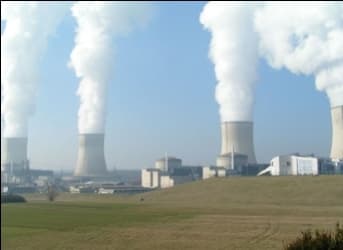When on 11 March 2011 a tsunami destroyed TEPCO’s Fukushima Daiichi nuclear power plant complex, many believed that the catastrophe, if not ending nuclear power generation worldwide, would at least induce an element of caution into governments seeking to advance nuclear power projects.
As the second anniversary of that dolorous event approaches, such has not proven to be the case. With the exception of Germany, which decided in the wake of Fukushima to mothball the nation’s 19 NPPs, many other nations have decided to go down the nuclear road, ensuring their nervous populations that nuclear power is in fact safe and environmentally friendly, as NPPs generate no greenhouse gases.
Among those pressing forward with NPP projects are India, Turkey and China.
The latest to enter the fray is Vietnam. Vietnam’s Song Da Corporation is preparing to send 2,000 workers and engineers to the Russian Federation and Japan for 2-3 years training in nuclear power construction, starting later this year.
Related article: Indian Nuclear Power Plant Sparks International Fears
Upon completing their courses, the workers will return to Vietnam to assist Russian and Japanese contractors to build the Ninh Thuan 1 and Ninh Thuan 2 nuclear power plants in the coming years. Last month Song Da Corp. signed a contract with Russian company NIAEP to send Vietnamese workers to the Russian Federation to assist in the construction of a four turbine, 4,000 megawatt facility at Rostov’s nuclear power plant. Two of the Rostov NPP turbines are already online, with the remaining two turbines scheduled for completion in 2015.
The Ninh Thuan NPP has the official seal of approval of the International Atomic Energy Agency, which during a joint seminar with Vietnam’s Ministry of Science and Technology held last December in Hanoi, made a number of suggestions as to how to implement the project.
The project is a godsend for the Russian Federation’s Rosatom Nuclear Energy State Corporation, which has seen its order books empty after Fukushima. Rosatom will partner with Vietnam Electricity to construct the Ninh Thuan NPP. Last December a senior Russian trade representative in Vietnam said that the Ninh Thuan Nuclear Power Project Management Board is a subsidiary of Vietnam Electricity with responsibility for managing Ninh Thuan 1 NPP, telling reporters, "Rostom issued a $8 billion credit policy for Ninh Thuan 1 nuclear power project and the Vietnamese company is undertaking a technology and business research review for the construction which will be completed in January."
Aside from massive credit and expertise, Rosatom will also provide the NPP’s nuclear fuel as well as process the spent fuel rods.
Construction of the Ninh Thuan 1 NPP is slated to begin by the end of 2014, with the facility scheduled to come online before the end of 2020.
The agreement represents a major breakthrough for the Russian Federation’s efforts to increase its trade turnover. In 2012, Russian-Vietnamese bilateral trade was worth $2.4 billion, a 24 percent increase from 2011 figures, while the trade turnover in January 2013 was $254 million, a 46 percent raise compared to the same period last year.
Related article: Iran Announces Discovery of Huge Uranium Deposits
Eight sites in central Vietnam are being considered as location for potential nuclear power plants besides Ninh Thuan, including locations in, Binh Dinh, Phu Yen, Ha Tinh and Quang Ngai provinces and according to a decision by Prime Minister Nguyen Tan Dung, by 2030 Vietnam will build 13 NPPs generating 15,000 megawatts, accounting for 10 percent of the country’s projected total power output.
Nor is the NPP the only potential benefit for the Russian Federation, as Russian Defense Minister General Sergei Shoigu is visiting Vietnam for talks on military cooperation, where he will visit Cam Ranh naval base in Cam Ranh Bay, a previous maintenance center for the warships of the Soviet Pacific Fleet. For those with a sense of irony, Cam Ranh Bay, Southeast Asia’s finest natural harbor, was the major U.S. naval base during the Vietnam war. According to Vietnam's Defence Minister, Phung Quang Thanh, the Vietnamese government has been inviting Russian experts to upgrade the base for more than two years.
So, the parameters of the deal are obvious – Russia gets paid, with military access to boot, while Vietnam ramps up its power production. While it seems unlikely that the Vietnamese population will publicly protest, the fact that the Ninh Thuan 1 NPP will be situated on the coast in order to utilize ocean water for coolant will make it subject to the vagaries of weather patterns sweeping across the South China Sea, including typhoons. One can only hope that the Rosatom engineers factor that into their planning.
By. John C.K. Daly of Oilprice.com



















Post fukushima, governments around the world, including China, revisited their policies on nuclear safety and ordered thorough checks on their existing NPPs. Many new builds were stopped and numerous reactors were temporarily taken offline for inspections and upgrades.
The international agencies tasked with nuclear safety when into overdive to meet the new demands for inspections against a new, tougher safety regimen.
So Fukushma has had an impact on government regulation and policy, but it has also proven that much of the cold-war hysteria that drives safety policy may well be falsehoods perpetrated by others with vested interests elswhere.
Nuclear power is the most safety-conscious heavy industry in the world today. I wonder how you and your colleagues in the oil industry would feel to be under the same rigorous safety regimen as nuclear power.
It don't sound good, you know?